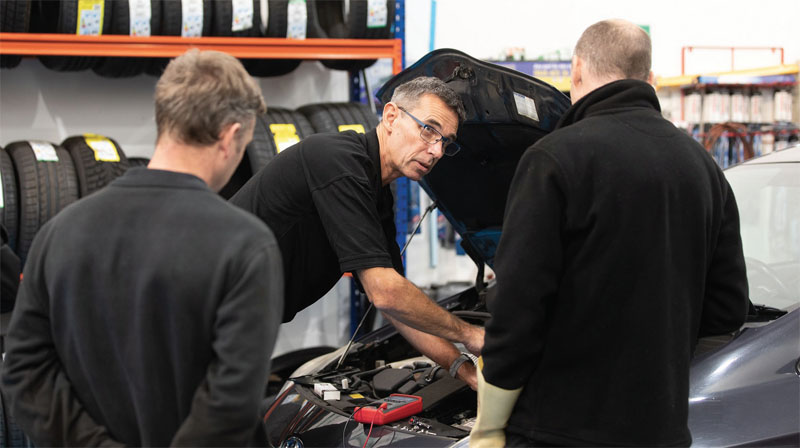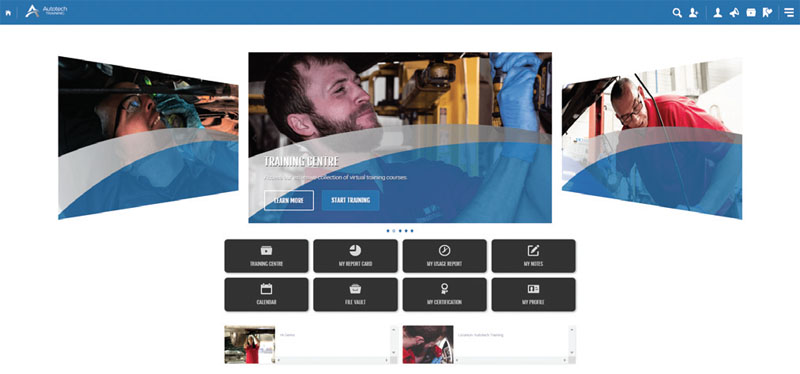
With a boom in online training as a result of the pandemic, it’s hard for independents to know what type of training they should prioritise. Mandla Ndhlovu, Head of Autotech Training, explains why, in this instance, variety is the spice of life.
Online learning has seen a steady growth over recent years, however, pre-COVID, the largest proportion of training remained face to face. During lockdown, increasing numbers of people were using the time to build their skill set, with a huge upsurge in enrolments for online learning platforms.
Armed with accelerated digital capabilities, the general public is expected to continue this eLearning trend, with the sector set to undergo a large boost in trading in the post-COVID period. According to a new report from Grant Thornton, amid the massive shift in norms around working from home created as a result of the lockdown, the training landscape will irrevocably change. While the delivery of face-to-face training will return, all industries will see a greater migration to digital, or blended online and face-to-face training formats. Where does that leave the automotive aftermarket?
In an industry which is evolving at rapid speed, up-skilling the current crop of vehicle technicians and MOT testers is vital, along with creating learning pathways for future generations. Cars are getting increasingly complex along with the technology required to repair them and consequently, vehicle technicians need a fantastic level of technical skill and knowledge.
Putting it into context, a Mercedes S Class has got 72 computers and 240 microprocessing systems all linked to make everything work together – it’s massively technical. However, this doesn’t even scratch the surface when autonomous and electric vehicles are taken into account. The recent news that new diesel and petrol car sales will be banned in the UK from 2030 has already led to a 500% surge in enquiries for EV and hybrid vehicles. Once this leads to sales, these cars will eventually filter through to the aftermarket for servicing and repairs, but without training, vehicle technicians are putting themselves at risk.
As a result, demand for training will continue to increase within the industry and there is every indication that it will continue to be offered in a blended delivery of online and face-to-face courses.
Even before the pandemic, we offered our network of 450 contractors training through our own, exclusive online training portal on OurVirtualAcademy.com, providing instant access to over 130 courses. This platform not only enabled contractors to up-skill, but also evaluate the new areas of automotive systems they needed training on.

Online vs face to face
OurVirtualAcademy.com was actually launched on the back of research which revealed that the average vehicle technician only remembers 20% of traditional training. So, while a more efficient training tool, online resources also provide a more cost-effective solution to vehicle technicians attending traditional courses far from their place of work as it means fewer working hours are lost, and the cost of travel is eliminated. There are also a number of in-depth, high quality technical courses on key vehicle components, which are continually being updated, readily available online to help technicians build a fix-first-time mentality.
Likewise, training providers can now deliver courses on the premises of any garage or business looking to up-skill their employees, while keeping their time away from business to a minimum. The latter offering demonstrates that, sometimes, there is no replacement for hands-on training and there will always be a demand for face-to-face learning within the automotive industry.
Building in a culture of ongoing training to ensure present employees remain as relevant, and as agile, as the evolving industry in which they work in is vital. The weeks and months ahead are set to be demanding with the number of MOTs coming through rising.
However, putting training at the bottom of the pile is short-sighted and, in some cases, it can’t be put off. Take the annual MOT assessment, if left too late, this could affect a VTS and a technician’s RAG rating. In a matter of hours, a technician can be trained to the current, DVSA syllabus and complete the assessment.

Anticipate electric
Employers should also put electric and hybrid vehicle courses to the top of their training agendas. While not yet regulated by the Government, it’s vital that employers realise they will be liable if untrained employees are injured while working on high-voltage vehicles. Ultimately, if technicians remain inadequately trained, it will only be a question of time before somebody, without the right knowledge, puts a spanner in a high voltage area.
We have recently announced plans to build a dedicated EV Training Suite, complete with an electric car, to deliver hands-on training, within our Milton Keynes headquarters. Our EV training courses can also be rolled out to any organisation or garage and delivered to a group of employees at once.
Whether it’s an online course or a face-to-face training session, the fact remains that the only way the current automotive workforce can sustain their roles is to keep up-skilling. Everyone within an automotive business should hold a level of responsibility, regardless of their position, to ensure that they have the relevant skill set to service vehicles safely and competently.









